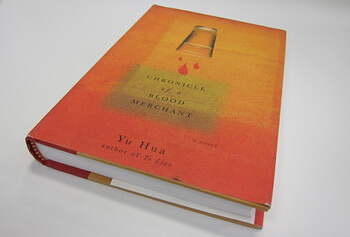
A film about a man who spends his life trading blood for cash, based on a novel by one of China's most celebrated writers, has finally begun shooting nearly 14 years after it was first announced. But it won't be a Chinese film.
一部讲述一个男人卖血换钱的人生故事的电影终于开拍。该片根据中国知名作家的小说改编,最初宣布拍片计划已经是14年前的事了。然而本片将不是一部中国影片。
'Chronicle of a Blood Merchant,' based on the 1995 novel of the same name by best-selling Chinese writer Yu Hua, began in the year 2000 as a collaboration between Korean producer Ahn Dong-Kyu and iconoclastic Chinese director Jiang Wen.
电影《许三观卖血记》(Chronicle of a Blood Merchant)根据中国畅销作家余华1995年同名小说改编。早在2000年,韩国制作人安东圭(Ahn Dong-Kyu)就有意与中国导演姜文合作拍摄这部电影。
The novel, published in 1995, tells a story of Xu Sanguan, a farmer who discovers selling blood as a shortcut to providing a better life for his family and becomes expert in gaming the system to squeeze every last yuan out of his veins. The story is mainly set in the 1950s and 1960s, when China weathered a terrible famine only to then be plunged into the turbulence of the Cultural Revolution.
小说《许三观卖血记》于1995年出版,主人公农民许三观发现卖血能让家人更快过上好日子,渐渐成了卖血“专业户”,竭尽性命拿血换钱。故事时间设定在上世纪50至60年代,当时中国在经历了严重的 荒之后,又陷入了文化大革命的动荡之中。
Mr. Ahn, now the film's co-executive producer, told China Real Time that he flew to Beijing to meet with Mr. Yu after he read the novel's Korean translation in 1999. He said he met Jiang Wen on Mr. Yu's recommendation, and both decided to work together to make the novel a film.
现担任该片联席执行制片人的安东圭对“中国实时报栏目”(China Real Time)说,在1999年阅读了韩文版《许三观卖血记》后,他飞往北京与余华见面。他说他在余华的推荐之下与姜文见面,两人决定合作将小说拍成电影。
'But Jiang Wen became officially unable to direct films due to a 7-year ban imposed on him for not getting permission from the Chinese government for the film he took to Cannes,' said Mr. Ahn, referring to Mr. Jiang's 'Devils on the Doorstep,' a film about Japanese soldiers invading a Chinese village during World War II that won him the Grand Prix at the Cannes Film Festival in 2000.
但安东圭说,当时姜文因未经政府批准携片参加戛纳国际电影节(Cannes Film Festival)而被官方禁止拍片长达七年之久。安东圭指的是姜文的《鬼子来了》(Devils on the Doorstep),这部讲述二战期间日本军人进攻中国村庄的电影获得了2000年戛纳国际电影节评委会大奖。
A spokesman for Mr. Jiang declined to comment. Now back in the good graces of China's film censors, the director is currently preparing for a 'Gone with The Bullets,' a 3D follow-up on 2010's satirical hit 'Let the Bullets Fly' that is expected to hit Chinese theaters in December.
姜文的发言人拒绝对此置评。如今重获中国电影审查部门青睐的姜文目前正在筹备3D电影《一步之遥》(Gone with The Bullets)。该片是其2010年热门电影《让子弹飞》(Let the Bullets Fly)的续集,预计将于12月在中国上映。
Mr. Ahn said he later made inquiries unofficially to some Chinese regulators for producing the film in China, but was rebuffed. He decided to make it a pure Korean production instead, shifting the story to Korea after the Korean War. 'Since Korea also experienced liberation, war and division, I found similarities in the sentiments of 'Chronicle of a Blood Merchant,'' he said.
安东圭说,后来他曾非正式地向一些中国监管机构打听在中国拍电影的情况,但遭到拒绝。于是,他决定拍一部纯韩版电影,将故事背景改在朝鲜半岛。安东圭说,由于朝鲜半岛也经历了解放、战争和分裂,他捕捉到了一些与《许三观卖血记》类似的情结。
Mr. Ahn has tapped Ha Jung-woo, a Korean actor turned director, to helm the film and assembled cast of Korean film stars. The film, which bag shooting in June, is expected to be released by early next year.
安东圭指定由演员转型做导演的河正宇(Ha Jung-woo)执导该片并为影片挑选强大的韩国影星阵容。这部电影已在6月开机,预计明年年初上映。
Contacted by China Real Time, Mr. Yu seemed lukewarm about the film's journey across the Yellow Sea . 'The Koreans are making it into a commercial film with huge investment,' said Mr. Yu, adding that he was unaware it had started shooting. ' I don't have any expectations for it at all,' he added, saying he believed the story would be made into a Chinese film sooner or later.
在接受“中国实时报”采访时,余华似乎对这部在黄海对岸的朝鲜半岛拍摄的电影感觉冷淡。余华说,韩国人把这个故事变成了一部投资巨大的商业电影,而且他对于电影的开机毫不知情。他补充说,他对这部影片没有任何期望,他相信这部小说将迟早会被拍成中国电影。
It's not the first run-in with China's film censors for Mr. Yu, whose novels are larded with biting critiques of Chinese society. 'To Live,' a film directed by famed Chinese director Zhang Yimou and based on Mr. Yu's novel of the same name, was banned in China after a triumphant showing at Cannes in 1994.
对于余华来说,这并不是他所经历的第一次中国电影审查,他的小说大都夹杂着对中国社会的尖锐批评。1994年,根据余华同名小说改编并由中国著名导演张艺谋拍摄的电影《活着》,在戛纳电影节上获奖之后在国内遭遇禁播。
News that 'Chronicle of a Blood Merchant' is finally being made into a film has met with ambivalence in the Chinese film community, where excitement at the prospect of seeing the story on the big screen has been tempered by frustration that it had to be made abroad. 'It's a good news but also a sad, because China cannot make this film,' Han Kaichen, a Chinese film producer, wrote on his verified Weibo account.
在经历多重曲折后,《许三观卖血记》终于将被拍成电影在大银幕上映令人激动不已。中国电影制片人韩凯臣在经认证的微博账户中写道:这是一个好消息,但不能由中国人自己来拍摄,这多少有些遗憾。
'I hope the adaption wins the Palm d'Or at Cannes and the Best Foreign Language Film at the Oscars,' film critic Bi Chenggong wrote on his own Weibo feed. 'It would be a slap to the face of this country's censorship system.'
影评人毕成功在微博上写道,我希望该片能斩获戛纳金棕榈奖和奥斯卡最佳外语片奖。这将是给予中国审查制度的最大羞辱。
Despite the sensitivities surrounding the project, Mr. Ahn hopes this film can be released in China. 'This film that I am making has nothing that will violate the current Chinese censorship rules,' he said, describing the movie as a story about a generation past that had to overcome hardships. 'Isn't China living in an era where it's possible to look back at its hard past as just a memory?'
尽管敏感因素很多,安东圭仍希望这部电影能在中国上映。他把电影描述为一个上一代人在绝境中奋力克服困难的故事。他说,我拍这部电影没有违反中国当前的审查规则。中国现在不是处于一个可以回顾以往艰苦岁月的时代吗?


